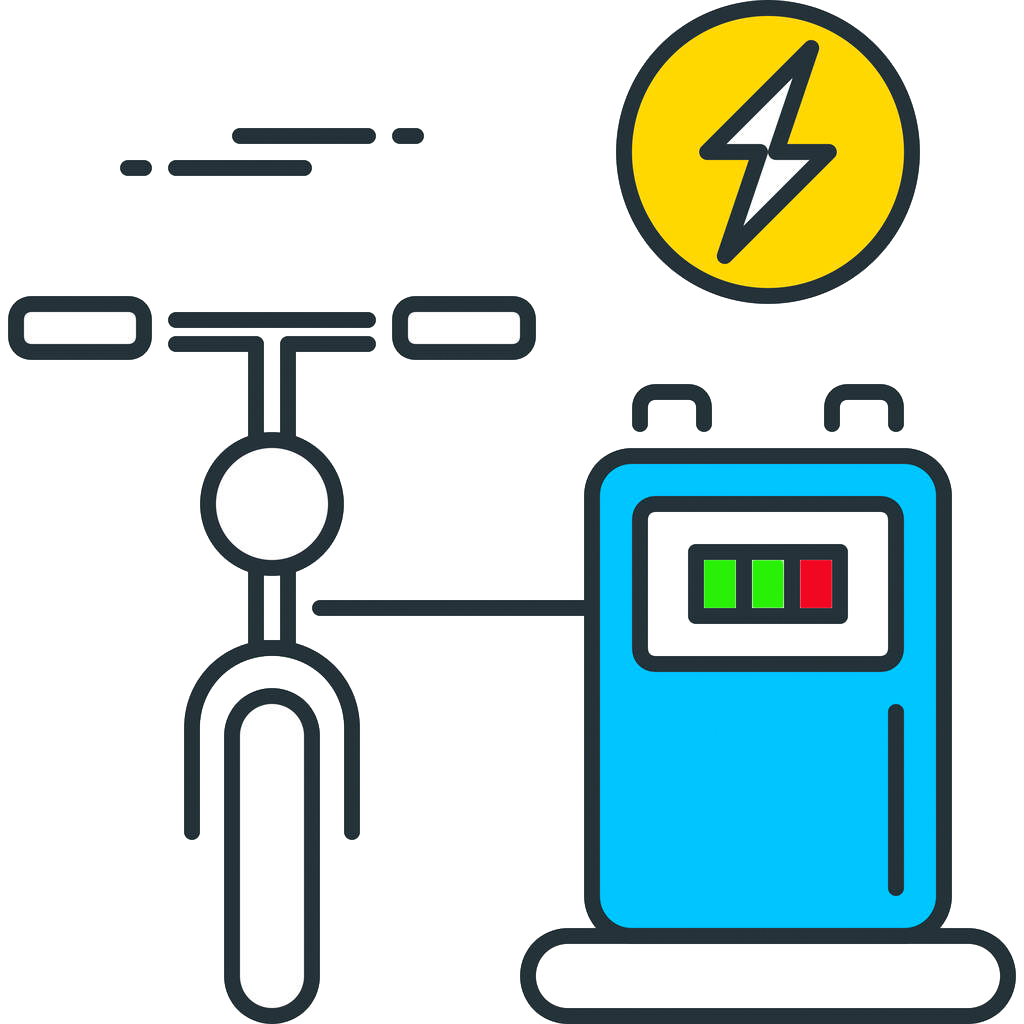The Risks of
E-Bike Batteries
The popularity of electric bikes (e-bikes) has taken off over the past few years. Lithium-ion batteries are usually the source of power, and if not used correctly, or if damaged, can catch on fire or explode.
Hundreds of e-bike battery fires and explosions happen each year due to malfunctioning and aging batteries.
E-Bike lithium batteries are often charged in or around homes and businesses. Even though there is a small chance of spontaneous ignition of an e-bike lithium battery, it can happen. It is unsure if or when a battery pack will explode, but when it does the damage is disastrous.
Whether you use an e-bike as your main way of getting around, or just for fun, there are important safety tips to keep in mind when charging or storing them.
Whether you use an e-bike as your main way of getting around, or just for fun, there are important safety tips to keep in mind when charging or storing them.


The Problem
When a battery overheats to the point that a thermal runaway reaction is triggered, the destructive effect of the explosion and fire is enormous. Since they are often times charged in or around homes and businesses, lives and property are at risk.
- Damaged or defective batteries can overheat, catch fire, or explode.
- Lithium-ion battery fires give off toxic gases and burn extremely hot.
Safety Tips To Remember
When a battery overheats to the point that a thermal runaway reaction is triggered, the destructive effect of the explosion and fire is enormous. Since they are often times charged in or around homes and businesses, lives and property are at risk.
- Always follow the instructions from the manufacturer.
- Make sure all batteries and charging equipment are UL rated.
- Only use the battery and charger that were designed for, and came with, the e-bike.
- Store e-bikes and batteries away from exit doors and anything that can get hot or catch fire.
- Do not modify a lithium-ion battery.
- Only charge one battery at a time to prevent overloading the circuit.
- Keep batteries at room temperature. Do not charge them at temperatures below 32ºF or above 105ºF.
- Do not store batteries in direct sunlight or inside hot vehicles, and keep them away from children and liquids.
- Never leave a charging battery unattended.
- Avoid overcharging batteries.
Lastly, make sure all e-bikes are stored in a safe area, not blocking entrance and egress points.
New York City Residents and Tenants
In a proactive move towards increasing safety, the New York City Housing Authority (NYCHA) has announced a new set of rules aimed at regulating the storage and charging of e-bikes and e-scooters within its housing developments. This comes after an alarming rise in fires attributed to the risk of lithium-ion batteries that power these devices.
Under the new guidelines, tenants will be permitted to keep and charge one e-bike or e-scooter per apartment, provided that the battery is certified as safe by an established safety body.
Tenants are allowed to keep and charge one e-bike or e-scooter per apartment.
The batteries must be certified as safe by an established safety body.
Yes, charging near apartment entryways is prohibited to ensure clear escape routes during emergencies.
Many NYCHA residents are delivery workers who rely on e-bikes and e-scooters for their jobs. The policy reflects NYCHA’s effort to address safety concerns while considering residents’ economic needs.
The new rules were introduced in response to a rise in fires resulting from improper handling of lithium-ion batteries, leading to casualties and property damage.
The Risks of
E-Bike Batteries
The popularity of electric bikes (e-bikes) has taken off over the past few years. Lithium-ion batteries are usually the source of power, and if not used correctly, or if damaged, can catch on fire or explode.
Hundreds of e-bike battery fires and explosions happen each year due to malfunctioning and aging batteries.
E-Bike lithium batteries are often charged in or around homes and businesses. Even though there is a small chance of spontaneous ignition of an e-bike lithium battery, it can happen. It is unsure if or when a battery pack will explode, but when it does the damage is disastrous.
Whether you use an e-bike as your main way of getting around, or just for fun, there are important safety tips to keep in mind when charging or storing them.
Whether you use an e-bike as your main way of getting around, or just for fun, there are important safety tips to keep in mind when charging or storing them.

The Problem
When a battery overheats to the point that a thermal runaway reaction is triggered, the destructive effect of the explosion and fire is enormous. Since they are often times charged in or around homes and businesses, lives and property are at risk.

- Damaged or defective batteries can overheat, catch fire, or explode.
- Lithium-ion battery fires give off toxic gases and burn extremely hot.
Safety Tips To Remember
When a battery overheats to the point that a thermal runaway reaction is triggered, the destructive effect of the explosion and fire is enormous. Since they are often times charged in or around homes and businesses, lives and property are at risk.
- Always follow the instructions from the manufacturer.
- Make sure all batteries and charging equipment are UL rated.
- Only use the battery and charger that were designed for, and came with, the e-bike.
- Store e-bikes and batteries away from exit doors and anything that can get hot or catch fire.
- Do not modify a lithium-ion battery.
- Only charge one battery at a time to prevent overloading the circuit.
- Keep batteries at room temperature. Do not charge them at temperatures below 32ºF or above 105ºF.
- Do not store batteries in direct sunlight or inside hot vehicles, and keep them away from children and liquids.
- Never leave a charging battery unattended.
- Avoid overcharging batteries.
Lastly, make sure all e-bikes are stored in a safe area, not blocking entrance and egress points.
New York City Residents and Tenants
In a proactive move towards increasing safety, the New York City Housing Authority (NYCHA) has announced a new set of rules aimed at regulating the storage and charging of e-bikes and e-scooters within its housing developments. This comes after an alarming rise in fires attributed to the risk of lithium-ion batteries that power these devices.
Under the new guidelines, tenants will be permitted to keep and charge one e-bike or e-scooter per apartment, provided that the battery is certified as safe by an established safety body.
Tenants are allowed to keep and charge one e-bike or e-scooter per apartment.
The batteries must be certified as safe by an established safety body.
Yes, charging near apartment entryways is prohibited to ensure clear escape routes during emergencies.
Many NYCHA residents are delivery workers who rely on e-bikes and e-scooters for their jobs. The policy reflects NYCHA’s effort to address safety concerns while considering residents’ economic needs.
The new rules were introduced in response to a rise in fires resulting from improper handling of lithium-ion batteries, leading to casualties and property damage.

